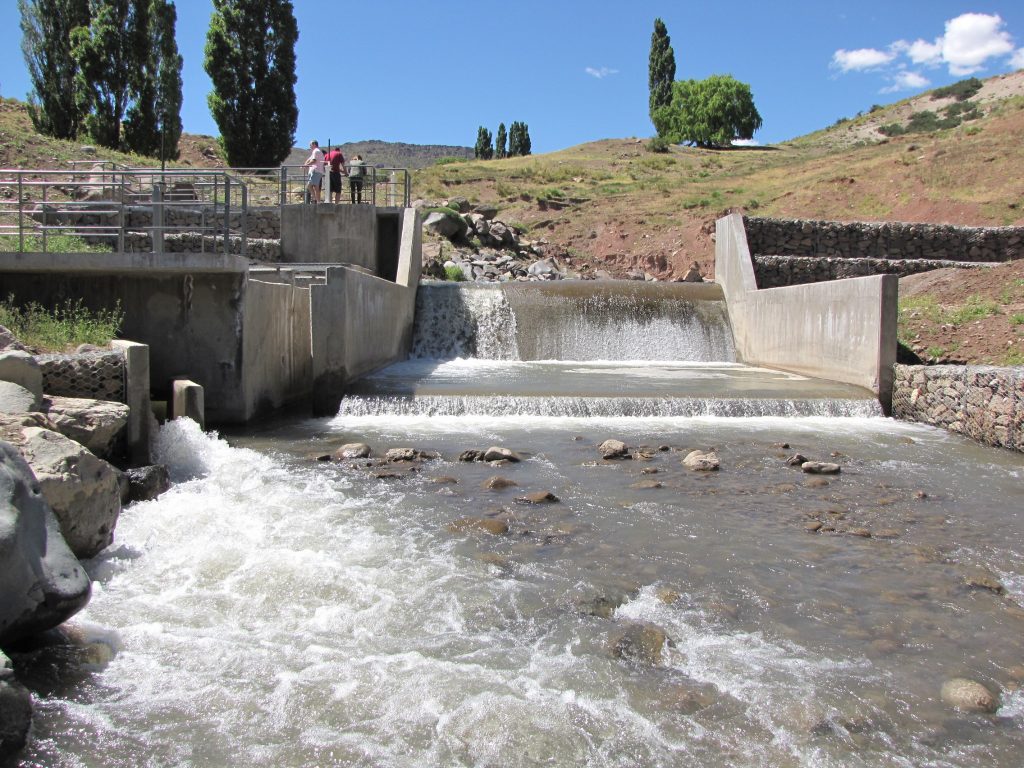Key results
- 65 kW run-of-the-river microhydro power plant generating 220,000 kWh per year, on average
- Provides affordable, reliable and sustainable electricity 24 hours a day, 7 days a week to a remote Patagonian community that previously had limited access to energy
- Replaces all the diesel previously used, providing fuel savings of around 137,000 USD per year and a reduction in CO2 emissions
- Generated fuel savings from this project and its sister wind-diesel hybrid project in Chorriaca will be reinvested into developing other similar renewable energy projects in surrounding off-grid villages by the provincial government
In 2013, we inaugurated a 65 kW run-of-the-river microhydro power plant in the remote village of Cochico, Argentina, providing residents with sustainable electric service 24 hours a day, 7 days a week.
The microhydro plant takes advantage of the natural resources unique to the Coyuco valley where Cochico is located. Access to a sustainable electric service is improving the quality of life for residents, in particular during the winter when daylight hours are shorter. Other than using the electricity from the plant to power homes, the local school and the health care station, with uninterrupted services, the electricity is also being used to power a hydro pump for irrigation, as well as a water treatment plant for the community.
In addition, the local leaders intend to develop other business activities by introducing refrigeration facilities for meat conservation and cheese fabrication. This will not only help diversify their economic activities, but will also help to inspire the younger generations to stay in Cochico to help preserve the town and its culture.
One of our key objectives was to help promote the scaling up of renewable energy projects in the region, which is in line with national and provincial interests to develop renewable energy generation. The local utility and distribution company, Ente Provincial de Energial Del Neuquén (EPEN), will use the fuel savings generated by this system (calculated at approximately 137,700 USD per year) and its sister wind-diesel hybrid project in Chorriaca to develop new renewable energy projects in the region. We transferred the ownership of the microhydro plant to EPEN in 2015. In addition, the sharing of technical know-how and experience from these projects will help build capacities for the development, operation and maintenance of similar systems in isolated towns within the province of Neuquén and in Argentina.
"I saw Cochico grow. I was the first President of the Development Commission. Today, I’m happy because I see that what I’ve always dreamed of has become real: electricity. One of the most important things is energy. Living without energy is very difficult. People got used to this situation; however, having power now allows us to change our dietary habits and eat fresh food, to improve our health, as well as to create new sources of work. We want young people to stay in this community to allow Cochico to grow, and their future will be different too. We want to help them improve and encourage them to take courses so they can get better jobs. Today, I see the joy that people have when I look at their faces. It is something that they have been awaiting for many years. Cochico has made progress, and hopefully we will live long to see further progress; that is my hope. I anticipate a good future for all of us and I can see the conditions to make it happen."
Domingo Rodriguez, President, Cochico Development Commission

Publication

The Argentina Patagonia Renewable Energy Projects
Promoting the development of local renewable energy sources to provide a sustainable and reliable electricity service to remote communities.
PARTICIPATING MEMBERS AND PARTNERS
- Duke Energy
- American Electric Power (AEP)
- Enel
- Hydro-Québec
- RusHydro
- RWE
- Neuquén Provincial Government
- Ente Provincial de Energía del Neuquén
- Chorriaca Development Commission
- Quilapi Mapuche community and Cochico residents

